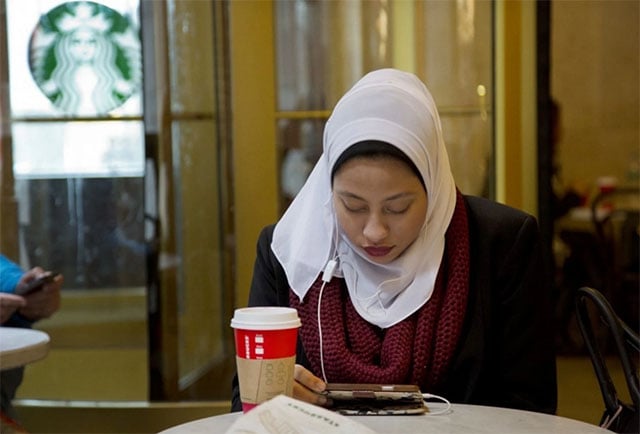Muslim Woman Sues Associated Press Over Photo of Her Wearing a Headscarf

A Muslim woman has filed a lawsuit against the Associated Press and AP photographer Mark Lennihan over a photo of her wearing a headscarf while sitting in a Starbucks. The image was sold as a stock photo and used in an opinion column that asked Muslim women not to wear the hijab.
On December 21st, 2015, the Washington Post licensed and used the photo to illustrate an opinion piece titled “As Muslim women, we actually ask you not to wear the hijab in the name of interfaith solidarity.”
![]()
The Washington Post reports that Youssef wasn’t pleased when she saw her photo being used to illustrate that article — particularly with some of the offensive comments that were left — so she decided to sue AP and Lennihan for selling the shot.
“Clearly, the article attacks [Youssef’s] fundamental beliefs,” the complaint says. “Plaintiff has been dismayed and deeply emotionally upset by defendants’ use of her photograph for advertisement and trade purposes, classifying her as ‘hijab, Muslim, Islam’ [in keywords on the AP site].”
![]()
Youssef is accusing the photographer and agency of violating New York’s “right of publicity” statute (New York Civil Rights Law § 51).
Any person whose name, portrait, picture or voice is used within this state for advertising purposes or for the purposes of trade without … written consent first obtained … may … sue and recover damages …. But nothing contained in this article shall be so construed as to prevent any person, firm or corporation from selling or otherwise transferring any material containing such name, portrait, picture or voice in whatever medium to any user of such name, portrait, picture or voice, or to any third party for sale or transfer directly or indirectly to such a user, for use in a manner lawful under this article ….
“This case is pivotal because there was no legitimate newsworthy purpose to taking her photo,” Youssef’s lawyer, Daniel Szalkiewicz, tells the New York Daily News. “There is nothing newsworthy about a woman in a hijab sitting in a Starbucks on her cell phone.”
Youssef isn’t suing the Washington Post, which published the photo, since news and opinion publications can legally use stock photos under the “right of publicity” laws. The Post also points out that the statute explicitly allows stock photos (e.g. the shot of Youssef) to be sold for lawful purposes.
“So there’ll be no occasion here, I think, for an interesting discussion of First Amendment constraints on the right of publicity,” writes law professor Eugene Volokh at The Post. “I just think the New York courts will find that Youssef has no claim under the New York statute.”
PDN’s David Walker agrees. “The case is a legal long shot, but if she wins, wire services and freelance photojournalists—at least in New York state—would have to get the consent of everyone in the photographs they offer for licensing to publishers,” he writes. “Youssef says in her claim that AP’s ‘sale’ [ie, licensing for fees] of images—including the image of her—amounts to commercial use, in violation of the state law. But she faces an uphill battle.”